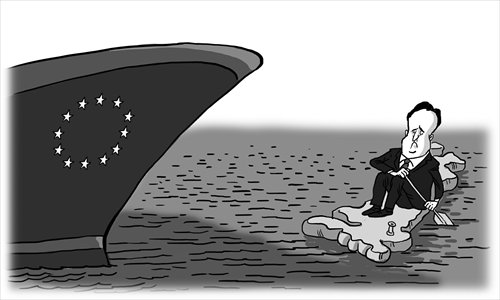EU referendum shows Cameron’s folly

In a striking display of political gamesmanship, British Prime Minister David Cameron has made a bold move to settle the UK's fractious relationship with the EU once and for all. Unfortunately, it is the wrong move.
Cameron has pledged that over the next few years, the terms of the UK's membership in the EU will be renegotiated. At the end of this period, once negotiations are complete and if the Tories stay in power after 2015, he will call a referendum, calling on the British people to vote on a straight in-or-out question as to whether the UK should remain part of the EU.
This aims to bring decision-making powers that the government feels have been lost to the EU back to British shores as well as to lessen British financial contributions to the EU. One wonders whether perhaps Cameron should visit Beijing's Silk Market for a crash course in bargaining.
Telling those you are about to negotiate with that any deal made will still have to undergo a major approval process before the deal-making has even begun leaves little incentive for them to negotiate.
Furthermore, eurosceptic members of the Tory party have said they will campaign for an "Out" vote if only token concessions are obtained. German Chancellor Angela Merkel and French President Francois Hollande and co will likely seek to appease Britain's concerns, but deep down, EU-wide resentments at the UK acting like a spoiled child may begin to fester.
However, one must admire Cameron's bravery and political nous. At home, this news has played very well. Ed Miliband, the Labour leader, was caught off-guard.
The eurosceptic United Kingdom Independence Party, without whose terrifying rise in the polls Cameron likely would not have made this decision, has been left wondering which side to choose.
A rising discord within the coalition government will temporarily have been quieted, despite squawks of anger from Liberal Democrats. Any putative leadership challenge by London Mayor Boris Johnson has likely been staved off.
It is a shame that Cameron is risking the anchor of British foreign and economic policy to stabilize his own poll ratings. But the EU can learn from this. In dealing with this privileged behavior from the UK, Brussels should also teach a lesson to other members who treat the EU budget as their personal piggy banks.
France has been collecting vast amounts of its subsidies for its agricultural sector, in particular, while Germany has sought to wield sole power over Europe's indebted countries.
If the EU is to survive as a real economic alliance rather than as a failed ideological vanity project, it must stop being dictated to by its largest constituents. The next few years will determine the bloc's survival. Economically and politically, the situation is dire.
Unemployment in Spain and Portugal threatens to cripple Iberia for a decade to come. Stagnation has led to extreme right-wing movements gaining traction in France, Italy and, most worryingly, in Greece.
Bureaucracy and unaccountability in Brussels have led even the EU's most ardent supporters to feel disconnected democratically from decisions made for them.
Some may say that the time has come to dissolve the EU, and that the UK has always been the wiser head, calling for a single market of loosely connected countries. But this would be a shameful path to take.
For every misstep that it has made, the EU and its previous incarnations have had larger successes: the stabilization of post-war Europe, the reunification of Germany, the support of East Europe after the fall of the Soviet Union, peace in the Balkans, the rise of Poland and the Czech Republic as viable democracies and the continued desire for entry of so many countries from Iceland to Turkey.
As hard as it is to imagine, the economic horrors of recent years can and must be fixed within the EU.
Today, eurosceptics like to gloat that the UK chose well to stay outside the crisis-ridden eurozone. Perhaps so. But has Britain been privy to some economic miracle that I have missed? News has come, since Cameron's speech announcing the referendum, that the UK looks likely to enter a triple-dip recession. In France and Germany, growth is returning for the moment, if still anemic.
The UK may pride itself on being an island nation, geographical evidence of its disconnection with the continent. But its fate is bound up with Europe, whether the country likes it or not.
As one of the largest economies in the world, the UK's continued participation will allow the EU to remain stronger and more resilient, punching at its fair weight in a global market crowded with new players.
Alone, the UK would certainly chug along, but perennially in the shadow of larger and greater powers.
The author is an editor with the Global Times. chrisdalby@globaltimes.com.cn